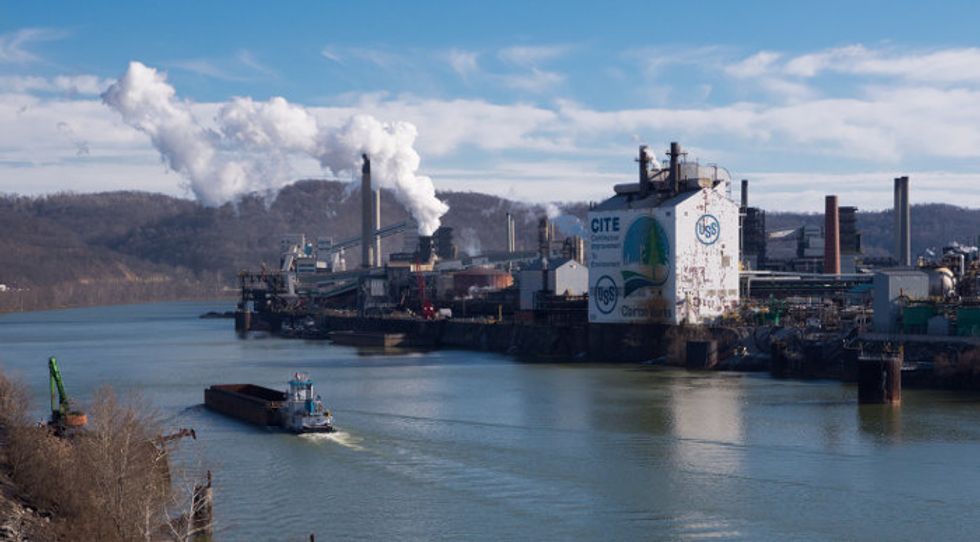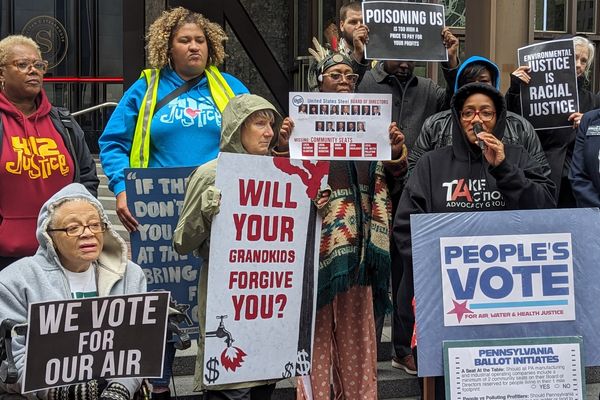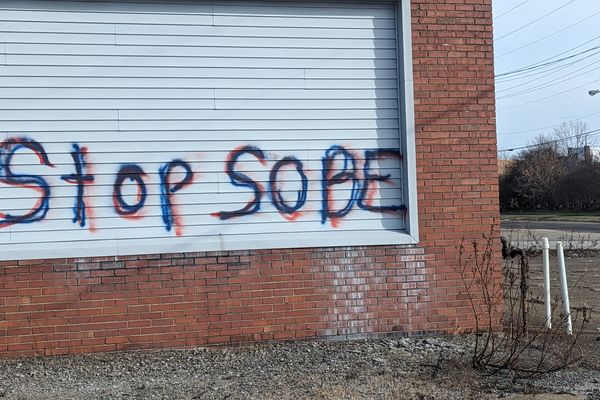pittsburgh
As Biden prepares to block the sale of U.S. Steel to Nippon Steel, pollution concerns persist in Pennsylvania
“Pennsylvania steel communities have lived with dangerous air quality for generations. That needs to end.”
PITTSBURGH — Amidst recent news that President Biden plans to block the sale of U.S. Steel to Nippon Steel on national security grounds, communities near the company’s plants in Pennsylvania say their concerns about pollution are still ignored.
While news about the merger has created political ripples nationally and internationally, members of environmental justice communities in the Pittsburgh region that have experienced elevated risk for asthma, lung disease and cancer for generations as a result of U.S. Steel’s harmful emissions say their voices aren’t being heard.
“Despite the drama in the press, the real issues remain the same,” Matthew Mehalik, executive director of the Breathe Project, a coalition of more than 30 groups advocating for more stringent air pollution controls in the region, said in a statement. “The ongoing threats from pollution from outdated and leaking coke and steel plants…need to be addressed.”New federal coke oven regulations

U.S. Steel's Clairton Coke Works.
Credit: Mark Dixon/flickr
Emissions from coke ovens, which convert coal into coke, a key ingredient in steelmaking, include chemicals like benzene, formaldehyde and heavy metals. Coke oven emissions are carcinogenic and are also linked to lung and respiratory disease.
There are coke ovens in 11 locations throughout the U.S., including Indiana and Alabama, but the largest coke plant in the country is U.S. Steel’s Clairton Coke Works, about 16 miles southeast of Pittsburgh. Communities surrounding the plant regularly see some of the highest daily air pollution levels in the country. U.S. Steel also has several other steel making facilities in the Pittsburgh region.
On July 5, the U.S. Environmental Protection Agency (EPA) imposed new regulations for coke ovens to reduce hazardous emissions of chemicals like benzene, mercury, lead and arsenic. Under the federal Clean Air Act, the EPA is supposed to update coke oven regulations every eight years, but it hadn’t done so since 2005, and it only issued the new rules after being sued by environmental advocacy groups over the delay.
"For decades, the EPA has ignored setting coke oven standards, allowing cancer-causing pollutants to harm communities in Pennsylvania, Alabama, Indiana, Michigan and Ohio,” Tosh Sagar, an attorney for Earthjustice, one of the advocacy groups that filed the lawsuit, said in a statement. “These communities have suffered enough."
A Pittsburgh-based U.S. Steel spokesperson said in a statement at the time that the company was “concerned” the new rules would result in “unprecedented costs” and called them “unachievable.” But environmental health advocates say the new rules don’t do enough to prevent cancer in people who live near these facilities.
“These communities have suffered enough." - Tosh Sagar, Earthjustice
On September 3, a group of environmental health advocacy groups including the Clean Air Council and PennEnvironment filed another federal lawsuit against the EPA demanding stronger regulations for benzene, saying the recently updated rules will still result in communities downwind from coke oven plants being exposed to dangerous levels of the carcinogen.
Air monitoring devices around U.S. Steel’s Clairton Coke Works and other coke plants by the Environmental Integrity Project, an environmental advocacy group, have detected dangerously high levels of benzene.
Meanwhile, U.S. Steel executives recently threatened to shut down the company’s Pittsburgh-area facilities and move its headquarters away from the region if Biden blocks the Nippon Steel deal, saying that as many as 3,800 union jobs in the region would be lost as a result.
“Subjecting the community to ongoing uncertainties about its future by threatening to move headquarters away and shut the plant down in a negotiation ignores the real social harms experienced by residents and workers who are manipulated without regard for their wellbeing,” Mehalik said. “Stop the 150-year trend of ignoring people impacted by harmful investment decisions.”
Continued use of coal in steelmaking
In April, residents of the Pittsburgh-area communities where U.S. Steel operates held a protest at the company’s corporate headquarters in downtown Pittsburgh to call attention to the company’s history of violating environmental regulations and harming the health of workers and residents amidst news of the potential merger.
The protesters noted that the company has a long history of breaking promises to clean up its operations in the region, pointing to the reversal of plans to make $1.5 billion in equipment upgrades that would have substantially lowered harmful emissions at its Pittsburgh-area plants while providing the region with up to 1,000 additional union jobs in 2021 as a recent example.
Climate advocates have also used news about the merger to raise awareness about both U.S. Steel’s and Nippon Steel’s continued reliance on coal, in contrast with competitors in the industry that are decarbonizing by expanding their capacity for green steelmaking.
Nippon Steel has pledged to spend $2.7 billion upgrading U.S. Steel’s plants if the deal goes through, including at least $1 billion in the Pittsburgh region, prompting U.S. Steel employees who support the deal to demonstrate outside U.S. Steel’s Pittsburgh headquarters with signs reading, “Nearly $3B reasons to say yes,” but environmental health advocates remain wary.
“Throwing around $3 billion figures about vague investments further subjects our region to stressful uncertainties without specific solutions to real community needs,” Mehalik said. “Talk to residents. Listen to what they need.”
Appalachian groups express frustration over first $30 million in federal hydrogen hub funding
“This award represents a continued commitment to invest in a natural gas industry that has added to the pollution and health burdens in the region.”
PITTSBURGH — On July 31, the federal government announced $30 million of funding for the Appalachian Regional Clean Hydrogen Hub, or ARCH2, which plans to create hydrogen from natural gas and other sources.
ARCH2 is one of seven planned, federally funded hydrogen hubs across the country, and one of two (along with the Gulf Coast hub) that will rely primarily on fossil fuel sources rather than renewables to create hydrogen.
The $30 million award represents the first round of funding for ARCH2, with a total of $925 million available for this project over the next seven to twelve years. In total, the seven planned hydrogen hub projects are slated to receive $7 billion in federal funding.
The $30 million will be used to “solidify planning, development, and design activities around site selection, technology deployment, community benefits and engagement, labor partnerships, and workforce training,” according to the U.S. Department of Energy (DOE).
The announcement comes just weeks after Pennsylvania governor Josh Shapiro signed into law a controversial bill allowing carbon capture and storage in the state, which will be required for the development of the hydrogen hub.
The award announcement frustrated local environmental and community advocates, who say the DOE has not been transparent about the details of the project, its climate and economic benefits, or its potential to add pollution and cause health harms in environmental justice communities that are already overburdened with existing pollution sources.
“This award represents a continued commitment to invest in a natural gas industry that has added to the pollution and health burdens in the region while failing to deliver any measurable growth in jobs, income and population,” Sean O’Leary, senior researcher with the Ohio River Valley Institute, a progressive think tank, said in a statement.
Earlier this year, the Ohio River Valley Institute delivered a letter to the DOE on behalf of 54 Appalachian organizations and community groups calling for the suspension of ARCH2. The letter called on the DOE to release additional information about the projects and offer impacted communities more meaningful opportunities for engagement prior to awarding additional funds — neither of which has happened, according to the organizations that signed the letter.
“Affected communities know little about the proposed projects and their impacts,” the No False Solutions PA Coalition said in a separate statement about the award. “Nevertheless, millions of dollars are being awarded to projects that will surely impact our health and environment BEFORE affected communities have had a chance to weigh in.”
Critics of the ARCH2 project say that carbon capture and storage technology hasn’t yet proven effective as a climate solution and it remains unclear whether hydrogen energy will abate or worsen climate change.
“There’s been a lot of talk about how hydrogen will be a cleaner energy source, but that overlooks the entire picture which includes reliance on the natural gas industry, which we know pollutes and harms communities and drives climate change with methane leaks,” Talor Musil, a field manager with the Environmental Health Project, a public health nonprofit, told EHN.
Pittsburgh's primary showcases progressive stance on fracking
In Pennsylvania's 12th congressional district, Rep. Summer Lee's campaign gains momentum with robust backing from environmental groups amid a primary battle that underscores the region's shifting priorities toward sustainable practices.
Keerti Gopal and Kiley Bense report for Inside Climate News.
In short:
- With the Democratic primary approaching, U.S. Rep. Summer Lee gains significant support from environmental groups, contrasting with her opponent Bhavini Patel.
- The endorsements focus on Lee's commitment to environmental justice, a shift from foreign policy issues to local environmental concerns.
- Edith Abeyta, a local environmental justice organizer, supports Lee for her consistent advocacy for communities affected by industrial pollution.
Key quote:
"For me, it’s this intersectionality that Lee upholds within her district. She represents a lot of people that live in environmental justice zones and frontline communities, and I think she gets it…she’s a voice for the people."
— Edith Abeyta, environmental justice organizer
Why this matters:
Progressive politicians and activists generally advocate for stricter regulations or outright bans on fracking, citing environmental degradation, health risks, and contributions to climate change. This emphasis on environmental justice and green jobs resonates with a district historically tied to heavy industry, suggesting a significant shift in voter priorities.
In late 2023, EHN reporter Kristina Marusic discussed new proposed fracking regulations in Pennsylvania on "Living on Earth.”
Listen: Why communities in Pennsylvania, Ohio and West Virginia are fighting chemical recycling plants
EHN reporter Kristina Marusic discusses her new three-part series on the controversies surrounding chemical recycling.
PITTSBURGH — EHN reporter Kristina Marusic recently spoke with The Allegheny Front about three communities in the Ohio River Valley that are fighting proposed chemical recycling plants.
Chemical recycling is an umbrella term for processes that use heat, chemicals or both to break down plastic waste into component parts for reuse as plastic feedstocks or as fuel. The industry says chemical recycling could help solve the plastic waste crisis, but some environmental health advocates say chemical recycling facilities worsen climate change and emit toxic chemicals.
Marusic recently wrote about community fights to stop proposed advanced recycling facilities in Ohio, Pennsylvania and West Virginia. Listen to her interview with The Allegheny Front below.
Vandergrift-area, Pittsburgh companies get millions in federal funding for clean energy expansion
Two companies in Southwestern Pennsylvania will get millions of dollars in federal funding to expand the manufacturing of clean energy technologies in the region.











